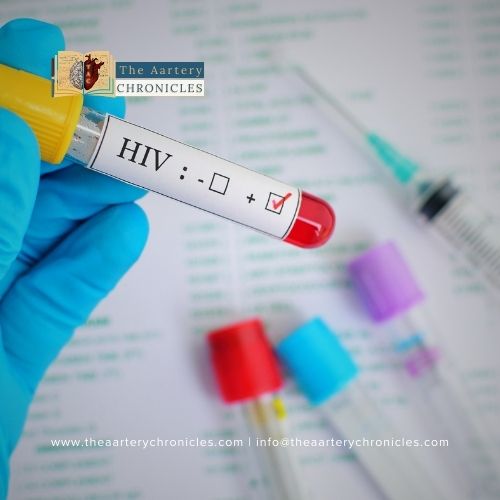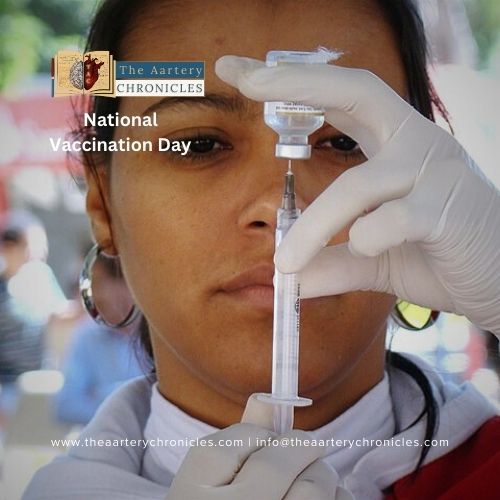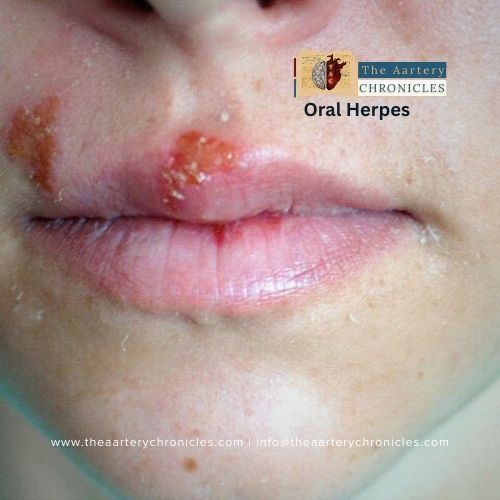
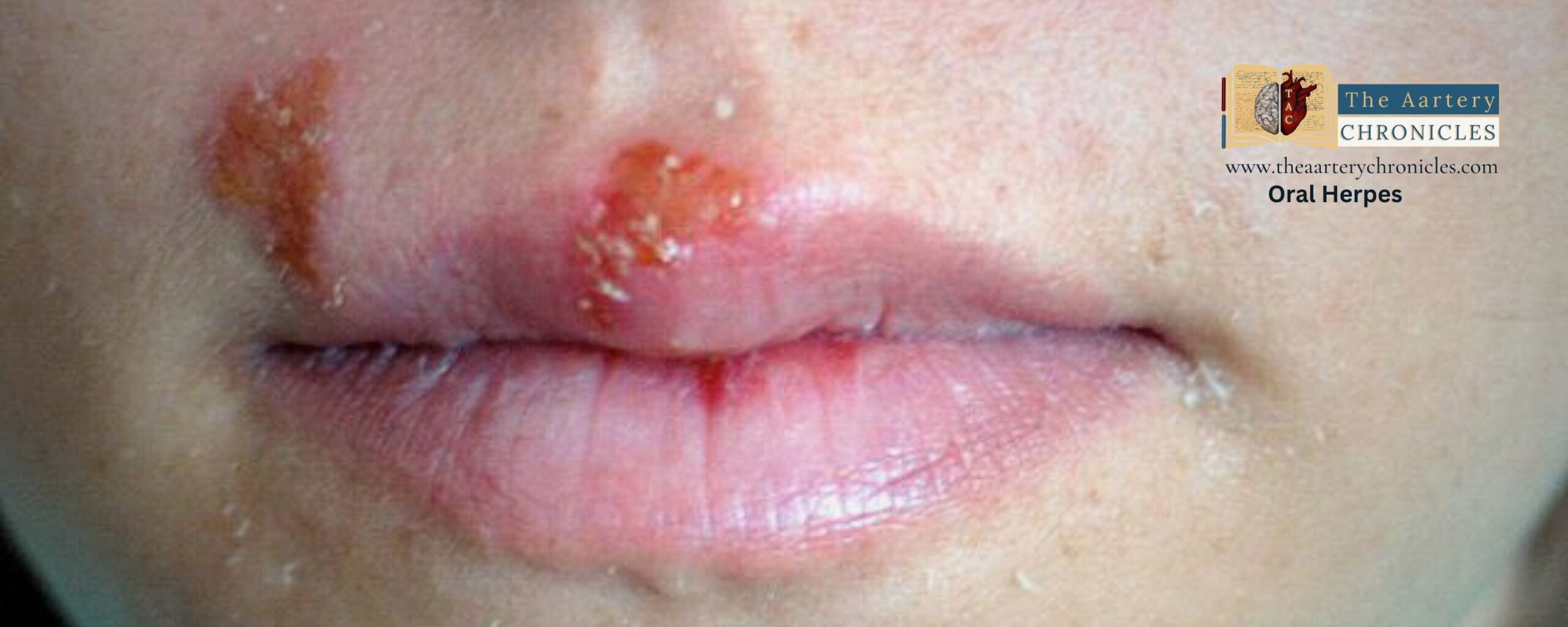
Dispelling Common Myths About Oral Herpes
It is important to uncover the truth behind oral herpes to understand this prevalent viral infection. This extensive guide will debunk common myths, present accurate information, and provide practical tips for the management and prevention of oral herpes.
An Overview of Herpes Simplex
What is herpes simplex?
Herpes simplex, also known as herpes, is a viral infection caused by the herpes simplex virus (HSV). This particular infection manifests itself through recurring episodes of painful blisters or ulcers in and around the mouth and face (oral herpes) or the genitals (genital herpes).
This commonly contagious infection is transmitted via skin-to-skin contact. Most of the individuals with herpes are asymptomatic, while others might occasionally exhibit mild episodes of outbreaks. The infection lasts a lifetime once contracted, and it is manageable in nature but not entirely curable. [1, 2]
What are the different types of herpes simplex virus?
Type 1 (HSV-1) and type 2 (HSV-2) are the two forms of the herpes simplex virus.
- Herpes simplex 1 (HSV-1): HSV-1, also known as oral herpes, is spread by oral contact. It tends to affect the areas surrounding the mouth and face. Some common symptoms of oral herpes include cold sores, orolabial ulcers, and blisters, which are ulcerations on the lips and around the mouth.
- Herpes simplex 2 (HSV-2): Commonly known as genital herpes, it is contracted through sexual contact with an infected person. It predominantly affects the genitals, resulting in sores and ulcers around those regions. [2, 3]
What are the global estimates and statistics on the herpes simplex virus?
According to the World Health Organization, the global prevalence and incidence of herpes simplex are estimated to be:
- In 2016 alone, approximately 67% of the population under the age of 50 was estimated to have developed an oral herpes infection.
- Additionally, in the same year, it was estimated that about 13% of the world’s population between the ages of 15 and 49 was afflicted with genital herpetic infection worldwide. [1]
Symptoms and Causes of the Herpes Simplex Virus (HSV)
What are the causes of oral herpes?
Oral herpes is mainly spread by
- Direct contact with individuals with an active herpes sore, their saliva, or other bodily secretions.
- Kissing an infected person
- Oral sex with an infected individual can transmit HSV-1 to the genital area, causing genital herpes
- Other skin-to-skin contact
- Shared utensils, razors, lip balms, or drinkware
Additionally, it’s crucial to note that individuals can still transmit the virus, even in the absence of visible symptoms, through a process known as asymptomatic shedding. This means that the virus can be contagious even when there are no noticeable sores or ulcers. This underlines the importance of practicing preventive measures consistently to reduce the risk of transmission [1, 2, 4].
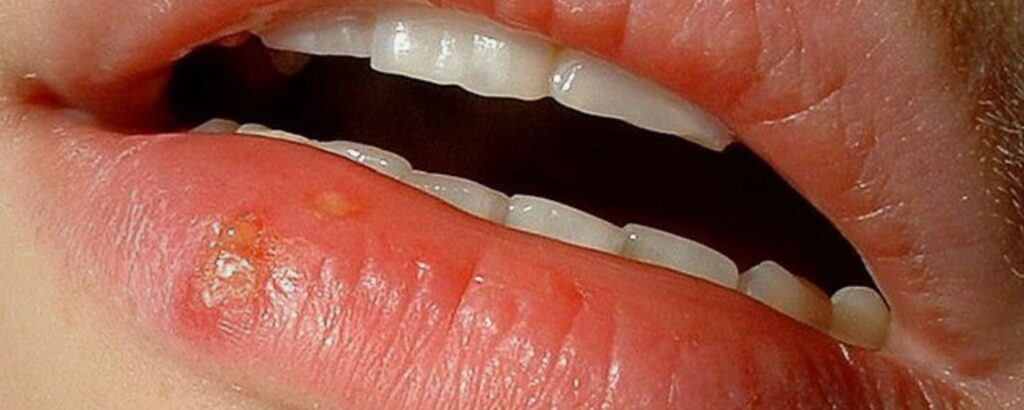
What are the signs and symptoms of oral herpes?
First Outbreak:
Initially, the first outbreak of herpetic infection tends to be severe, in contrast to a recurrent episode.
Signs and symptoms of an oral herpetic outbreak exhibit flu-like symptoms that include:
- Fever
- Body ache
- Sore throat
- Headache
- Swollen lymph nodes at and around the site of infection
During the first infection, painful sores and blisters may appear in the orofacial and orolabial regions (in and around the mouth and face). It’s crucial to recognize that the manifestation of flu-like symptoms can vary from person to person, and some individuals may not exhibit these particular symptoms during their initial outbreak.[1, 3, 4]
Recurrent Episodes:
Some individuals don’t experience any recurrent episodes of outbreak apart from the initial infection. While in some cases, recurring episodes of infection are seen which may vary from one or two outbreaks during the entirety of their life to four or five outbreaks a year. [2, 4]
Recurring outbreaks tend to be shorter and milder than the first outbreak. Some common signs and symptoms of oral herpetic infections include:
- Painful, fluid-filled blisters and cold sores develop in and around the mouth, lips, tongue, or nose.
- Initial redness, itchiness, swelling, pain, or tingling sensation at the site of infection.
- The fluid-filled blisters burst open to leak fluid and become sores.
- The sores tend to turn crusty and heal over a period of four to six days. [2, 4]
Management of Oral Herpes
When it comes to managing oral herpes, it’s essential to understand that while antiviral medications can effectively manage symptoms, they do not eliminate the virus from the body.
What are the treatment options for oral herpes?
People who exhibit no or fewer outbreaks tend to forego the medication, while other infected individuals take medications to manage and alleviate the symptoms of the infection. Medicines can decrease the severity and duration of herpetic infections, but they can’t cure them entirely.
What is the importance of Early Treatment?
Early treatment during outbreaks is crucial for more effective results. Initiating antiviral medication promptly can help in reducing the severity of symptoms and shorten the duration of the infection. This underscores the importance of seeking medical advice and beginning treatment at the onset of symptoms or during prodromal stages
Management of oral herpetic infection includes:
- Keeping the site of infection clean and dry.
- Antiviral oral medications like acyclovir, famciclovir, and valacyclovir are the first line of treatment and traditionally the most effective option for the management of oral herpes.
- Application of antiviral topical ointments such as acyclovir and penciclovir
- Over-the-counter topical anaesthetic or anti-inflammatory agents help alleviate painful symptoms. [4]
What are the home remedies to treat oral herpes?
While home remedies can help alleviate symptoms, it’s important to understand that they do not replace medical treatment. Some of the home remedies to manage the symptoms of oral herpes include:
- Drinking iced drinks
- Sucking on popsicles
- Applying ice or cold compresses to blisters and sores
- Use over-the-counter pain medications [1]
Prevention of Oral Herpes
When it comes to preventing the transmission of oral herpes, adopting certain practices is crucial. It’s not just about individual well-being but also about protecting those around you
What are the preventive measures to reduce the risk of oral herpes?
People with oral herpes symptoms should avoid direct contact with others, which includes:
- Kissing
- Oral sex
- Contact with their saliva or skin near their mouth
- Sharing of utensils, razors, lip balms, or other products [1, 2]
Pregnant women with herpetic infection should discuss it with their healthcare providers because of the risk of passing down the infection to the baby. [1]
Conclusion
Dispelling myths about oral herpes involves understanding its nuances, symptoms, and management strategies. By fostering awareness and open communication, we can contribute to a more informed and supportive community.

Author: Dr. Anjali Singh
BDS [KGMC, Lucknow]
- Medicine
- Nutrition And Diet
Lorem ipsum dolor sit amet, consectetur adipiscing elit. Ut elit tellus, luctus nec ullamcorper mattis, pulvinar dapibus leo.










